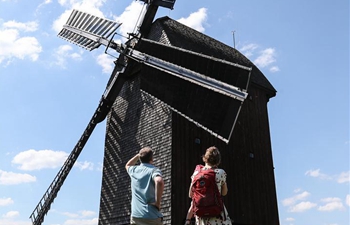SHIJIAZHUANG, May 21 (Xinhua) -- In 2015, Li Qiuchao became a member of the village affairs supervision committee of Nanliche in north China's Hebei Province.
The supervision committee has three members including Li, 42, voted in by the village assembly. Their job is to audit village affairs and financial management, as well as to canvas villagers' opinions.
"I do not earn anything from this job. I do the job out of concern for village affairs," said Li.
In March 2018, Nanliche decided to spend one million yuan (about 160,000 U.S. dollars) building an auditorium. The committee was responsible for finances of the construction project.
"We booked every expense on construction material," Li said, touching an account book. "No money is disbursed without our permission."
Nanliche is one of the 238 villages in Wuqiang County to up supervisory commissions since 2014 to "curb corruption, promote harmony and stability, and improve governance."
Li Huiming, head of Nanliche village committee of the Communist Party of China (CPC), said the commission "helps a lot" in village affairs.
"The commission is a bridge delivering the people's opinions and suggestions to the village assembly," said Li.
Villagers also spoke highly of the committee.
"The committee ensures full disclosure in village affairs. We are relieved," said Wang Zhanting from Nanliche.
In Wuqiang, the number of complaints about rural officials involved in corruption fell from 62 in 2016 to 43 in last year.
"The committees broaden and deepen supervision of village affairs and curb corruption," said Guo Daigeng, deputy secretary of the Wuqiang county commission for discipline inspection.
Corruption of officials at village level is a huge problem in China. In 2017, around 527,000 officials found themselves in trouble, many of whom were at the village level, and in December, central authorities released a guideline on setting up village supervisory commissions across the country.
The commissions should be made up of three to five people with some knowledge of management or accounting, and voted in by the village meeting or villagers' assembly. They should ensure decision making is in accordance with standard procedures, and work for full disclosure in village affairs, especially construction projects, agriculture and poverty alleviation.
The committees are effective in spotting problems before they arise and preventing officials from slipping into corruption, said Guo.
In Nanliche, construction of the village auditorium is well underway. Li often goes to the site to keep up to date with progress.
"Our committee has villagers' trust," said Li. "We intend to keep it that way."

















